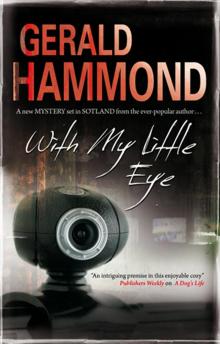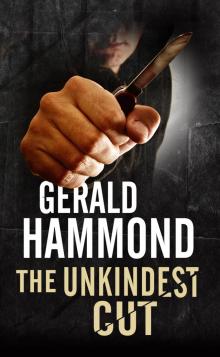- Home
- Gerald Hammond
Pursuit of Arms
Pursuit of Arms Read online
PURSUIT OF ARMS
Gerald Hammond
© Gerald Hammond 1985
Gerald Hammond has asserted his rights under the Copyright, Design and Patents Act, 1988, to be identified as the author of this work.
First published in 1985 by Macmillan.
This edition published in 2017 by Endeavour Media Ltd.
Table of Contents
Chapter One
Chapter Two
Chapter Three
Chapter Four
Chapter Five
Chapter Six
Chapter Seven
Chapter Eight
Chapter Nine
Chapter Ten
Chapter Eleven
Chapter Twelve
Chapter Thirteen
Chapter Fourteen
Chapter Fifteen
Chapter Sixteen
Chapter One
The combine harvester with its attendant tractor and trailer turned and began the last cut down the middle of the big barley field. Keith Calder and his brother-in-law waited at the further end. Ideally, they would have liked to walk beside the harvester, but the modern machine moves faster than a man can walk.
Keith recognised the familiar heightening of expectation and knew that it was absurd. When he was young, there would have been a dozen men and more boys, with guns and sticks, waiting for rabbits and rats to bolt as the last of their cover was harvested. But myxomatosis and the changing face of agriculture had taken their toll. There might be nothing to bolt, or just the odd pheasant still out of season. But not to worry. It was a pleasure to wait, in the summer sunshine, courtesy of Neill McLelland the farmer. Lairy Farm lay in a dip so that its closeness to the southern fringe of the town was not apparent. But for the main road traffic, angling up the slope of the hill, they could have been deep in the countryside.
Keith stole a glance at the far corner of the field where Neill McLelland was operating the baler. He was, Keith noted with displeasure, making the huge, round bales favoured by farmers for their easy handling by modern machinery, and not the smaller, rectangular bales which were desired by the pigeon-shooter for hides and by the clay pigeon enthusiasts for protecting the trapper.
The combine harvester was only a hundred yards away now. One hen pheasant, out of range as well as out of season, whirred up from dangerously close to the blades, then set her wings and glided towards the distant hedge. Keith saw the contractor’s man, driving the combine, raise an imaginary gun. A hare streaked across the stubble and clapped down into hiding. There would be time to look for it later, but Keith knew that it would not be there. Hares had an astonishing knack for disappearing. No wonder, Keith thought, that they were credited with miraculous powers.
Brutus, the old labrador, nosed his master’s leg. But Keith’s attention was on his brother-in-law. Ronnie was pointing at the very edge of the barley. “Fox!” he shouted over the thrum of the approaching machines.
Keith set himself for a shot. No fox would slip by if he could help it. Keith detested foxes, and not only for their predation on gamebirds and domestic fowl. One day, some sentimental fool would smuggle the wrong pet into the country, and with it rabies; and the spread of that shocking disease would depend upon the density of the fox population.
The machines were drowning all other sound. Keith concentrated on watching the edge of the barley.
The fox bolted suddenly on Keith’s side. He held his fire for a moment in case the tractor driver should be endangered by a ricochet. The fox could have gone to safety between the tractor’s wheels, but it turned away from the lumbering monsters and took a new line past the less obvious menace of the man. Keith kept still, for fear of turning it again. When he judged, from the corner of his eye, that the range was an ideal twenty yards, he turned with practised grace, mounting his gun and slipping off the safety-catch as he turned.
As his forefinger moved to the front trigger, he froze, horrified. A man was approaching him, only a few yards away.
The fox jinked away over the stubble.
Keith raised his barrels. “You stupid, suicidal moron!” he said. His voice had gone squeaky with fright. “Didn’t your mother ever warn you not to come up behind a man who’s ready with a gun?”
“She told me that a man as experienced as you are would look behind him before taking a shot,” the other retorted calmly.
“I looked behind me when I got myself set. I didn’t expect some crazy sod to come pussyfooting up behind me. I could have blown your brains out, if you had any. As it is, I’d have filled the air with sawdust and parrot-crap.” Having relieved his feelings with what he felt to be a well-phrased rebuke, Keith took his first calm look at the newcomer; a small, elderly man, grey and wrinkled and with full, fat lips. In the heat of the moment and meeting the other out of context, Keith had thought him a stranger; but now the penny dropped. “You’ve spent your life around guns,” he added. “You ought to have learned sense.”
“There’s a lot of things I ought to’ve done,” the other said. “More than I care to think about. But at least I’m not the one standing in the way of the tractor.” Keith moved hastily out of the way. “I wanted to see you on a matter of business. I called at your shop, and your partner said that you were overhauling guns in your workshop at home. So I drove out to your house. Your wife said you’d gone out. When I pushed it, she said to look for you here. Playing hookey?”
Keith had got over his annoyance, but he made up his mind to keep the other on the defensive. Something told him that bargaining time was not far away. Eddie Adoni, third-generation Italian, was a medium-sized arms dealer of mixed reputation who had occasionally used Keith for the overhaul of modern guns or the disposal of antiques.
“I don’t do business in guns with men I can’t trust around them,” Keith said. Even to himself, he sounded sulky.
Eddie’s plump lips twisted in a mirthless smile. “I’ll take my money elsewhere, then,” he said. “But we’re talking about a lot of cash.”
“You’re not just trying to palm off a Chasspot rifle as a Von Dreyse needle-gun again?”
“That was an honest mistake. No, I told you I’m spending money.”
“Then I’ll listen,” Keith said sadly. His stolen day was lost to him.
“Let’s not talk in a field. My car’s in the farmyard.”
“Give me two minutes.”
Keith made his excuses to his brother-in-law, who seemed relieved rather than disappointed at the end to their sport. He found Eddie waiting in the driving seat of a year-old Volvo Estate. Keith dropped his cartridge-belt, game-bag and bagged gun onto the back seat and sat in beside Eddie. “Business must be good,” he said.
“You’ve got to keep up a front.” Eddie started the car and drove gently onto the tarmac farm road. He parked in the shade of some trees. The car, which had been standing in the sun, began to cool off. “Mr Calder — Keith — how would you like to quote for a big contract, overhauling a whole lot of Sterling S.M.G.s and nine-mil Brownings? Re-blue when necessary.”
“How many?”
“Nearly three thousand Sterlings and a thousand Brownings. I don’t know the exact number yet. Quote me a per-each price.”
“Not on your screaming Nelly,” Keith said. He thought furiously. He had undertaken such contracts before. He had access to space in the town, an overflow workshop held available by an engineering firm, and several retired engineers and gunsmiths were only too happy to pick up the extra money. But why would Eddie come to him? Keith could never undercut the prices that Eddie could have got elsewhere. “The Sterlings would only be on the market because they’re clapped out,” he said, “and I’ll bet half the Brownings are the old Model Nineteen-hundred.”
“They’re all Mark One
s,” Eddie said. “A lot of them are still in waxed wrapping paper.”
“Great! Those’ll be wartime manufacture. The ones by John Inglis of Canada are usually all right, but a whole lot of the ones made in Belgium for the Germans were sabotaged to the point of being dangerous. Every one of them will have to be opened, stripped and checked. I’d only consider it on piecework.”
“Give me some sort of bracket, so that I know we’re not wasting my time,” Eddie said quickly. He seemed to have been expecting Keith’s obduracy.
Keith thought some more. In competition with Birmingham, he would be priced out. There had to be some other reason for Eddie approaching him. He quoted some rates, but kept them high.
Eddie sighed the sigh of a man who has done his best for a friend, and started his engine. “You’d leave me less than no margin,” he said. “Shall I drop you at home or at the shop?”
“Home,” Keith said. “My car’s there.”
The car moved forward and as they crested a slight rise the town of Newton Lauder grew out of the ground to their left. Almost opposite was the group of new, box-like factories where Keith would find his workshop space if the contract came to him, but almost immediately Eddie was threading the car through the streets of the town, between buildings of weathered stone. Keith turned his face aside as they passed the shop. Soon they were out into the country again. While his mind raced ahead, Keith was content to chat desultorily about John Moses Browning, the amazing innovator who had led the field in so many aspects of gun design. Eddie was silent except for the occasional grunt until they left the road again for a byroad and then for the short drive of Briesland House.
“There is just one other thing,” Eddie said as he brought the car to a halt. “If you don’t want the big job, you might care to take on a smaller one.”
Here it came. “I might,” Keith said.
“You took out a patent a few years ago . . .”
“I’ve taken out eleven patents,” Keith said. He thought that he could make a very good guess as to which one interested Eddie Adoni. “Don’t tell me that you’re interested in an artificial pigeon decoy which can flap its wings in a treetop? Or a shotgun safety-catch which locks the action?”
“You know bloody well I’m not. Revolvers. You patented an adapted action which brings the cylinder to rest with the hammer between cartridges.”
Keith smiled inside himself, but not a hint of it showed. His guess had been good. “What about it?”
“Could you convert four hundred?”
“In what sort of timescale?”
“No great hurry,” Eddie said. “February would do.”
“Depends what model. New Style Engineering make the bits for me, and if they’ve already got the dies in stock it should be no problem.”
“Webley and Scott thirty-eights, Mark Six.”
“No problem at all,” Keith said. “We did a whole lot for a Caribbean police force.”
“How much?”
Again Keith thought before he spoke, and again he pitched his price high.
“Oh, come on,” Eddie said. “You’d leave me no margin at all. How about selling me a licence to get the conversions done somewhere else?”
Keith shook his head.
“Well,” Eddie said, “if that’s your attitude I’ll just have to take my business elsewhere.”
“Try and take that part of your business elsewhere,” Keith said, “and I’ll slap an interdict on you and then sue your pants off. Let me tell you how I see it. Some small country going independent. The President-elect has to equip, or re-equip, his forces, and you’ve quoted. He’s probably getting a grant for the cost, and if he’s spending sterling he’s about to become an ex-Brit. The grant would be based on the new prices, so he’s buying second-hand and either pocketing the balance or using it for good works, as if we cared which. Very sensibly, he’s equipping his forces with an S.M.G. and a self-loading pistol which take the same ammunition, thus breaking the habit, prevalent in such places, of sending troops out with the right gun and the wrong ammo, or vice versa.
“But his police force are the boys who will be near him and responsible for his safety. So he’s giving them revolvers for reliability. But, either as a prestige gimmick or because he doesn’t want them going off when dropped near him, he fancies having them Calderised.”
Eddie Adoni had been staring out of the windscreen, tight-lipped. Now he turned and glared. “And what’s any of that got to do with the price of fish?” he asked.
“Not a lot,” Keith said. “Just this. At that sort of numbers and timing, there’s only one place the guns could be going. So what’s to stop me dropping His Coffee-coloured Nibs a line, suggesting that he can buy his guns wherever he likes — from you, for all I care — but that if he wants the revolvers Calderised, I do all the work, at my prices, for him and not you.”
“You sod! I believe you’d do it. Listen,” Eddie said, “it’s a good deal I’m offering you. Play your cards right and you could win yourself a free holiday in the sunshine, instructing the instructors.”
“No, thank you very much,” Keith said. “Once, when I was very young and innocent, I went to Africa on a deal like that. Within a fortnight there was a coup, and I found myself acting as armourer to a rebel army. What was worse, it turned out to be the losing side and I was lucky to get out with the same number of balls I went in with.”
“All right. So what do you want?”
“A straight deal, signed and sealed, with no room for your usual tricks. Money up-front. And if I do any of the work I do it all. Given that, I can maybe shave the price a wee bit.”
“I should bloody well hope so. How wee?”
“Not that damn wee,” Keith said cheerfully. “Hang on while I drop my gear inside and get the car out. Then we’ll go back to the shop and let Wallace in on the haggling.”
*
Keith returned to Briesland House later than usual that evening. After a draft contract had been signed and missives exchanged, he had driven fifty miles without ever being more than five miles from the shop, making sure that his usual force of retired specialists was still ready and willing. From the shop, he had phoned off an order for blueing chemicals. And he had visited the industrial estate to reassure himself that the usual workshop space would be available. To this last he was only able to obtain a qualified answer; his was not the only business in line for a rush of work.
Instead of pausing for his usual admiring look at the house, Keith plunged inside, eager to share with Molly the news of that day’s business coup. To celebrate the imminence of ‘found money’, he had paused in his travels to raid the local shops, bringing home several luxurious toys for daughter Deborah and, more for his own pleasure than hers, some confections of silk and lace to adorn his wife.
But Molly was also brimming with news, in which state she was difficult to override. “You’ll never believe what’s happened,” she began.
“Probably not,” Keith said. He vanished into the toilet under the stairs.
Molly’s voice followed him through the closed door. “Ronnie was here. He brought Brutus home. He’s in his box.”
“Ronnie is?”
“Brutus. He wants to see you.”
“Brutus does?”
“Ronnie does.”
Keith emerged. “Big deal,” he said. “And talking about big deals —”
“Ronnie had a girlfriend with him,” Molly said.
“Yet another old boot. Is my dinner ready?”
“Dried up and spoiled. Not another old boot this time,” Molly said reluctantly. “Very . . . svelte. Lean and athletic and looks as if she could tear telephone directories in half. She sounds German or Russian or something.”
“She certainly doesn’t sound like Ronnie,” Keith said. “Could we discuss her over what’s left of my dinner, instead of standing in the hall?”
“Ronnie said that she was a dancer. I think she’s moved in with him.”
Keith was having d
ifficulty envisaging Molly’s roughhewn brother in the company of a German or Russian dancer, except perhaps a Hamburg stripper. “You’re sure she’s a dancer?” he asked.
“That’s what Ronnie said. And, come to think of it, he said she was Polish.”
Keith snapped his fingers. “I know who she is,” he said. He turned and walked into the kitchen.
Molly trotted behind. “Who?” she asked. “Who?”
“I’ll tell you when I’ve got my dinner.”
Molly knew when she was beaten. She put out Keith’s roast beef. It was still satisfactorily moist but he had opened a beer for himself, just in case.
“Well?” Molly said.
“Delicious.”
“I’ll take it away!”
“A tiger couldn’t take it away,” Keith said with his mouth full.
“Oh, Keith . . .”
Keith relented. He emptied his mouth and rinsed it with beer. “You remember, last January, you and I and Janet and Wal were going to go through to Glasgow for a night out and to see the ballet of The Taming of the Shrew at the King’s Theatre, and you cried off?”
Molly nodded. “Old Minnie had flu and I stayed to look after her. Ronnie took my ticket. I couldn’t think why. Ballet isn’t his scene at all.”
Keith had to empty his mouth again. “He thought he was going to see Kiss Me Kate. He still thinks that he saw it. Same plot, after all. He was half-cut before we set off and he had a bucketful over dinner. In that state, he could follow the story without noticing that there wasn’t any dialogue. He was very taken with Katherina in the first half, when she was fighting with her family and taking kicks at the passers-by. He thought she was a lassie of spirit. He called her ‘skeich and birkie’, which is more than he ever said about the old boots. He spent the second half in the bar, so he never saw the shrew after the taming. He came away with his illusions intact.
“The part was danced by a stand-in, because the prima ballerina had pulled a hamstring or something in rehearsal, and I can’t say I’m surprised. They made an announcement of the change, and there was something about it in the paper. She was a Polish ballerina who defected when the Moscow State Ballet came to Covent Garden. I forget how her name was spelled, but I think it was pronounced ‘Butchinska’.”

 Home to Roost
Home to Roost A Dead Question
A Dead Question Twice Bitten
Twice Bitten The Curse of the Cockers
The Curse of the Cockers In Loving Memory
In Loving Memory Illegal Tender (Three Oaks Book 12)
Illegal Tender (Three Oaks Book 12) Cold Relations (Honey Laird Book 1)
Cold Relations (Honey Laird Book 1) A Brace of Skeet
A Brace of Skeet Silver City Scandal
Silver City Scandal Sauce For the Pigeon
Sauce For the Pigeon Cold Relations
Cold Relations Hook or Crook
Hook or Crook The Curse of the Cockers (Three Oaks Book 5)
The Curse of the Cockers (Three Oaks Book 5) Snatch Crop
Snatch Crop Sting in the Tail (Three Oaks Book 6)
Sting in the Tail (Three Oaks Book 6) A Dead Question (Honey Laird Book 2)
A Dead Question (Honey Laird Book 2) In Loving Memory (Honey Laird Book 3)
In Loving Memory (Honey Laird Book 3) Thin Air
Thin Air Sting in the Tail
Sting in the Tail Pursuit of Arms
Pursuit of Arms The Game
The Game Give a Dog a Name (Three Oaks Book 4)
Give a Dog a Name (Three Oaks Book 4) Fair Game
Fair Game The Executor (Keith Calder Book 10)
The Executor (Keith Calder Book 10) Whose Dog Are You? (Three Oaks Book 2)
Whose Dog Are You? (Three Oaks Book 2) Mad Dogs and Scotsmen (Three Oaks Book 7)
Mad Dogs and Scotsmen (Three Oaks Book 7) Cousin Once Removed
Cousin Once Removed The Worried Widow
The Worried Widow A Shocking Affair
A Shocking Affair Dead Weight (Three Oaks Book 11)
Dead Weight (Three Oaks Book 11) Whose Dog Are You
Whose Dog Are You The Revenge Game
The Revenge Game With My Little Eye
With My Little Eye Doghouse (Three Oaks Book 3)
Doghouse (Three Oaks Book 3) In Camera
In Camera Bloodlines (Three Oaks Book 8)
Bloodlines (Three Oaks Book 8) The Unkindest Cut
The Unkindest Cut